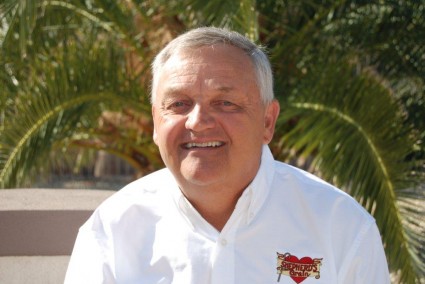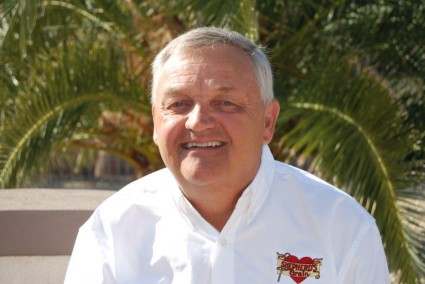An April 13, the Natural Resources Defense Council (NRDC) announced the four winners of its second annual “Growing Green” awards, which honor leaders in the sustainable-food world in four categories: “thought leader,” “producer,” business leader,” and “water steward.” I interviewed “thought leader” Fred Kirschenmann here. Now I turn my attention to Karl Kupers of Shepherd’s Grain, who harvested the “business leader” honors.
————
 Karl Kupers of Sheherd’s Grain: leading his region’s wheat farmers out of the commodity trap. Imagine launching a career as a wheat farmer in the 1970s. As the decades wore on, you’d be excused for wondering if you hadn’t stumbled into a scene from the Book of Job.
Karl Kupers of Sheherd’s Grain: leading his region’s wheat farmers out of the commodity trap. Imagine launching a career as a wheat farmer in the 1970s. As the decades wore on, you’d be excused for wondering if you hadn’t stumbled into a scene from the Book of Job.
You’d have seen the price of your prized commodity fall steadily since you started out — until, by 2000, a bushel of wheat was trading at less than a third of the inflation-adjusted average price it fetched in the 1970s, according to this FAO report. Of course, the biofuel boom pushed up prices of all ag commodities since starting in 2007; but even today, wheat prices hover at less than half of what they were in the 1970s — even as prices of inputs like fertilizer and seeds have surged.
With wheat prices in the dirt, you’d have two obvious choices: 1) drop out of the business and find a more profitable use for your time; or 2) or scale up, buy more land, and try to make up on volume what you’re losing on price. Of course, if you take the second option, you’ll also want to squeeze as much out of each acre as possible — and that means bigger and more gas-guzzling machines, more agrichemicals, etc.
But there are other choices, too. One is to opt out of the commodity market, which only really cares about cheapness, and create a product that distinguishes itself by its quality. Rather than obsessing about producing more, you’d think hard about producing better — and find people willing to pay a little more for food grown with ecologically sustainable practices. And instead of the constant struggle to scale up, you’d reach out — building market power by joining forces with like-minded growers.
In 1999, Karl Kupers and his partner Fred Fleming did just that, launching Shepherd’s Grain flours in Spokane, Wash. Today, 33 certified-sustainable farmer-owners market their wheat through Shepherd’s Grain, which has earned reputation for its top-quality flours among bakers in the northwest. Soon after news of his Growing Green award emerged, I caught up with Karl on the phone.
————
Q. Tell us a little bit about Shepherd’s Grain.
A. The basic philosophy of Shepherd’s Grain is to reconnect the producers to the consumer, and provide an economic mechanism to support farmers who want to preserve and even improve their land for the next generation. The thing that struck me was that high levels of tillage, which was eroding our soil, had become became very the least sustainable thing we were doing out here. So that;s the first thing we focused on: giving farmers a way to transition to a system that relied much less on tillage.
Q. Can you explain to me what your growers are doing to reduce tillage?
A. The method is simply no till. Nature doesn’t till. Unfortunately, when people came to these parts [the Northwest] they were able to till the soil and release all of that natural nutrient capacity. And we just kept at it for the next 140 years. And using tillage, you eventually reduce and in some cases eliminate the growing capacity of the soil.
When we first tried no-till here in the ’70s, it struggled — primarily because it was still being dealt with in a monocultured system. And we now know that to be successful, no-till needs much greater diversity in the system.
Q. By diversity, are you talking about cover crops or other species besides wheat?
A. Yes, the latter. We’re actually working towards developing more along the cover crop idea as well. But the key is diversity. It’s simple. You go to your ecosystem where you live and you go find a native piece of ground that’s never been touched and you do an inventory of the plant material there. Nature’s telling you what works well in the rotation. So that’s all you’re doing is mimicking nature at that point with your rotation and you select species that do well in your ecosystem.
Q. When I think of no-till today, I think of “chemical no-till” — the practice of using crops genetically modified to withstand herbicides. Instead of tilling to control weeds, you just douse fields with agrichemicals. Of course, there is no GM what. How do you guys avoid tillage?
A. Well, we still use herbicides, but we focus in minimizing them. We’re very aware of the resistance problem with Roundup. We don’t want to use it anymore than necessary. We also know that in addition to rotating crops, you also have to rotate your herbicides; you can’t rely on just one.
But the real key in a natural system is understanding that your soil is your true resource and the microbes in the soil are your lifeblood. That’s the first thing. You make sure you’re doing nothing to harm the microbial population, and you’re doing everything to enhance that microbial population.
Q. I’m guessing Shepard’s Grain flour sells at a premium to faceless, place-less commodity flour.
A. Well, I’m always hesitant to use the word “premium.” But with Shepard’s Grain, we went from being a “price taker,” which is what farmers are in a commodity market, to having a little more power to set our prices in the marketplace. If you’re truly going to be sustainable, you’ve got to cover your cost of production, and the commodity market has no correlation to that today.



